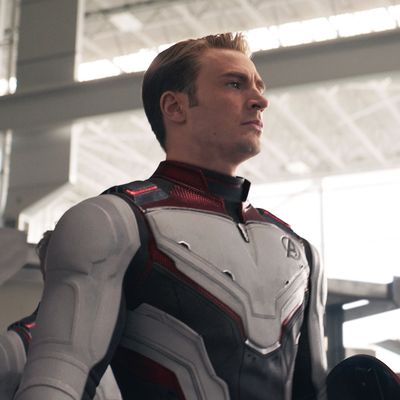
Light spoilers ahead for Avengers: Endgame.
Somewhere in the first act of Avengers: Endgame — when the movie’s acting like a riff on The Leftovers, but before it becomes a time-travel cousin of Harry Potter and the Cursed Child — there’s a blink-and-you’ll-miss-it scene that’s pretty groundbreaking. Captain America is at a support group for people trying to cope after The Snap, and some ordinary guy starts talking about his date with another guy, which did not go well because they both started crying. First of all, that’s very relatable; it happens to me on dates all the time. Secondly, yep, you heard that right, this guy who loves the Mets (very masc) is gay, and what’s more, he’s the first openly gay character in a Marvel superhero movie. Captain America, An Ally, tells the gay guy that things are hard, but he’s doing good work getting himself out there, and then the scene ends. Throw up the banners! Bring out the pride parade! Time to celebrate, uh, gay Mets guy!
Joe, one of the two Russo brothers who directed Endgame, plays the gay character himself. He and his brother Antony recently discussed that moment with Deadline, explaining why they wanted to make sure a moment like it appeared in their movie. “It was important to us as we did four of these films, we wanted a gay character somewhere in them,” Joe said. “We felt it was important that one of us play him, to ensure the integrity and show it is so important to the filmmakers that one of us is representing that. It is a perfect time, because one of the things that is compelling about the Marvel Universe moving forward is its focus on diversity.” It’s a good sentiment, and it’s nice that the directors are pushing for more inclusion in the Marvel universe, but really, why does this all feel so … exhausting?
In large part, it feels like Avengers: Endgame’s moment is part of a trend of big movies paying lip service to the idea of representing a great variety of people on screen, rather than the (mostly) straight white men who have consumed dangerous amounts of protein powder, without putting in the hard work to make that representation meaningful. Star Trek Beyond made John Cho’s Sulu gay with a man-hug that you probably wouldn’t have noticed if it weren’t for the discourse that sprung up around it. Beauty and the Beast gave LeFou that infamous “exclusively gay moment” that amounted to a short dance with a henchman. Compared to those two scenes, at least Joe Russo’s character in Endgame has the time to work through some emotional complexity — he’s sad, and he assumes he will be less sad if he’s dating (a mistake I have also made) — but the moment’s still tangential to the larger story. With or without him, this is still a universe where action is defined and propelled by its straight and/or sentient plant leads. (Some of them might be queer, sure, but we haven’t heard about it!) Including a scene with a gay character as minor as this doesn’t rectify that reality, it just makes the overwhelming sameness of the rest of the enterprise more stark.
This isn’t to say that I don’t appreciate seeing gay characters appear on screen, or that I want studios to stop depicting them. Considering how tied a movie’s success is to the international box office — and how some country’s governments feel about homosexuality (see Bohemian Rhapsody’s China edit) — it is, in an abstract, unemotional way, impressive that the Russo brothers got such a direct mention of homosexuality into Avengers: Endgame. And it’s impressive that Marvel is seemingly committed to continuing to expand and diversify its collection of heroes. The entertainment company did this some with movies like Captain Marvel and Black Panther, and it seems to be doing so behind and in front of the camera in the future. (Chloe Zhao’s Eternals, for instance, is rumored — rumored! — to be looking to cast a gay Asian lead.)
But being impressed and being satisfied are two different things. Especially when, most of all, I feel tired. It’s exhausting to have to cling to a minor step toward depicting the world as it is 22-episodes — I mean, movies — into a multi-billion dollar franchise. It’s exhausting to watch a movie pat itself on its back in a battle scene by having all the female heroes band to together for a big moment, while knowing that most of them are secondary to the male characters in their respective movie plots (and that Black Widow, arguably the biggest name of the universe’s female heroes before Captain Marvel, killed herself for the good of the team, or whatever, before she got her own movie). It’s exhausting to celebrate that steps are being made. It’s exhausting to cheer on the fact that changes are coming. It’s exhausting to feel obligated to say thank you to the gigantic corporate monolith even as it swallows smaller corporations and guts the parts of them that made smaller movies that might actually be more appealing to you.
I think a lot about how it’s one thing to say “things are changing” and another to actually change things, and how there’s a lot of the first and less of the second. Maybe the superhero genre is the wrong venue to hope for much change anyway, but hey, it’s the rare thing everyone’s watching. Anyway, congrats to the gay Mets guy on his date. I hope he goes on another one, and that the sex is good (though we’d probably never hear about that). I hope he’s not obliterated by a giant portal, or a space monster, or a super villain played by an Oscar-winning actress who was cast to appeal to his demographic, or whatever else happens in the next 22 Marvel movies that won’t directly involve him.


